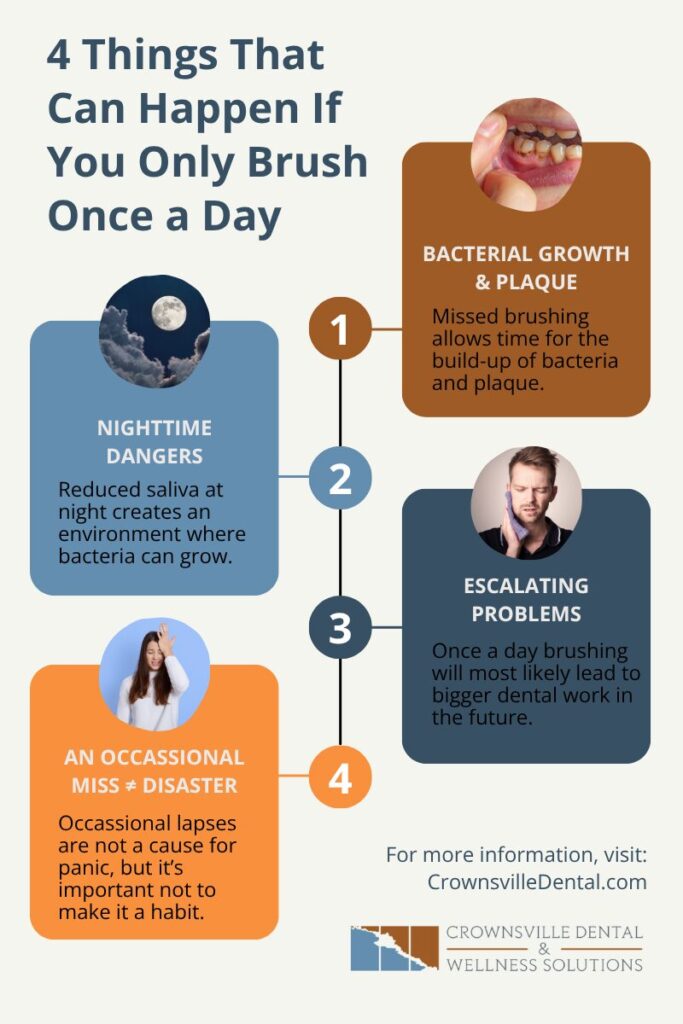How Brushing Once a Day Affects Oral Hygiene
As your Crownsville dentist, we can’t argue with the American Dental Association when they recommend brushing your teeth twice daily at the very least—morning and night. But life happens. Sometimes you’re tired, distracted, or just forget. But what happens when you’re busy and you forget?
Good oral hygiene isn’t only about avoiding cavities; it’s also key to maintaining a confident, beautiful smile. Whether you’re interested in services like teeth whitening or exploring Invisalign, a solid dental care routine is essential. Learn more from the Crownsville Dental & Wellness Solutions team about what happens when you only brush your teeth once a day, and what you can do to keep your teeth healthy.
#1 – Bigtime Bacteria Buildup & Plaque Growth
Whenever you eat or drink something other than water, there’s a chance that part of it will be left behind. What sticks to your teeth is this film, where bacteria love to hide and grow. Bacteria in your mouth feed on those particles, forming a sticky layer called plaque. When you attack them with a brush twice a day, you disrupt this buildup before it hardens into tartar, but brushing only once gives bacteria time to multiply. As bacteria grow, they release acids that attack your enamel and irritate your gums. Over time, this can lead to tooth decay, gum inflammation, and eventually gum disease if left untreated.
#2 – A Nighttime of Terror – Don’t Let Bacteria Win
This is the time of year we tend to get spooky, but did you know your mouth can have some scary things going on at night? Bacteria leftover from food have the chance to lurk about all night, creating havoc for your enamel and oral hygiene. Skipping a nighttime brushing session is one of the worst things you can do for your oral hygiene. While you sleep, saliva production naturally slows down, which makes it easier for bacteria to thrive.
If you go to bed without brushing, food residue and bacteria stay in your mouth for hours. This allows acids to eat away at your enamel and increases your risk for bad breath, cavities, and gum irritation. Your Crownsville dentist will tell you this happens while you’re asleep, especially when you forget to brush your teeth before bed. Brushing before bed is one of the simplest, most effective ways to protect your smile.
#3 – One Thing Leads to Another (Avoid Major Dental Work)
Our hygienists love giving good hygiene tips about all things general dentistry, especially when it leads to better brushing at home. Neglecting your brushing routine doesn’t just cause minor issues—it can lead to major dental problems down the road.
You should avoid brushing your teeth only once daily because it could cost you in the long run in so many ways. When bacteria and plaque aren’t removed regularly, you may begin to experience gum inflammation or bleeding, a sign of gingivitis. Left untreated, this can progress to periodontitis, a severe gum infection that can damage the bone supporting your teeth. Over time, you may require deep cleanings, fillings, crowns, or even extractions. You could be in a position requiring more extensive dental work in the future, with more intensive conditions you don’t deserve to deal with. Preventive care and consistent brushing are far less costly and less stressful than major restorative treatments later.
#4 – One is Better Than None (Just Don’t Make It a Habit)
As your trusted Crownsville dentist, we’ll let you in on a little secret: brushing once a day, once in a while, is not going to ruin your smile. But if it becomes a habit, the long-term effects can be damaging. Aim to brush your teeth for two minutes, twice daily, using a soft-bristled brush and fluoride toothpaste. Focus on gentle circular motions, cleaning along the gumline and all tooth surfaces. End your day with flossing to remove food and plaque that your toothbrush can’t reach.
Consistency is key to keeping your teeth strong and your gums healthy. You might worry about cavities, but if you occasionally brush only once a day, don’t panic. It’s okay to have a day where once is enough.
Tips & Strategies to Stay on Track
- Set reminders using your phone or smart speaker to brush morning and night.
- Pair brushing with a routine, like showering or bedtime reading, to make it a habit.
- Keep a travel brush or disposable toothbrush in your bag or car for busy days.
- Track your progress with a calendar or habit-tracking app.
- Schedule regular cleanings every six months to keep your teeth and gums in top shape.

Bonus: Why This Matters If You’re Considering Invisalign
If you’re thinking about Invisalign, maintaining good oral hygiene is even more critical. Clear aligners can trap food particles and bacteria against your teeth if you don’t brush regularly. Without proper cleaning, you risk developing white spots, gum irritation, or cavities beneath the aligners. Invisalign patients should brush after every meal or snack, rinse their aligners before reinserting them, and continue seeing their dentist for professional cleanings. A consistent brushing routine ensures that your Invisalign treatment enhances your smile.
Brushing once a day might not immediately harm your teeth, but over time, it can lead to serious dental problems. Combining consistent daily habits with professional care helps you maintain a healthy, confident smile. Whether you’re searching for teeth whitening, general dentistry, or exploring Invisalign in Crownsville, talk to Dr. Eric Rabovsky about how you can make taking care of your oral and overall health easier to manage.

